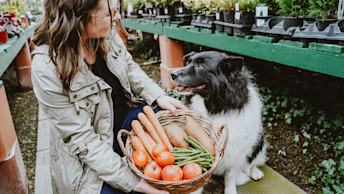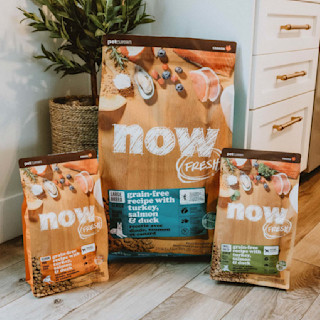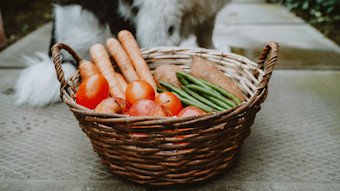October 8, 2025
What Vegetables Can Dogs Eat?

As a pet parent, you want to make sure your dog gets the best nutrition possible. While high-quality dog food provides complete and balanced meals, adding fresh vegetables can be a great way to give your pup some extra nutrients, fiber, and natural flavors. But not all veggies are safe for dogs. So, what vegetables can dogs eat? Let’s take a look at the best vegetables for dogs that are both nutritious and dog-friendly.
What Vegetables Are Good for Dogs?
The following vegetables are not only safe for dogs but can also be found in high-quality dog food recipes. That means they’re already recognized for their nutritional benefits and digestibility.
When introducing new treats, always start with a small amount. Treats should make up no more than 10% of your dog's daily caloric intake.
1. Carrots
Carrots are a crunchy, vitamin-packed treat for dogs. They’re rich in beta-carotene, the precursor of vitamin A, supporting healthy vision, bolstering the immune system, and supporting their overall well-being.
2. Sweet Potatoes
Sweet potatoes are an excellent source of carbohydrates, protein, fiber, essential vitamins, and minerals like manganese. It’s also a source of the antioxidant beta-carotene, supporting a healthy immune system.

Our Recommendation
Looking for a Food That Already Includes These Wholesome Ingredients?
Our premium dog food recipes incorporate all these superfoods and more to provide balanced, natural nutrition for your pet. With tasty and nutritious ingredients like pumpkin, carrots, and broccoli.
View dog food3. Pumpkin
Pumpkin is a powerhouse for digestion. It’s packed with fiber to help support healthy digestion, along with essential vitamins, minerals, and beta-carotene, supporting immune function and vision health.
Avoid pumpkin pie fillings due to the added spices and sugars. Look for pureed pumpkin, where the only ingredient is pumpkin.
4. Squash
Squash is full of vitamins A and C, which help support your dog’s immune system. It’s also a great source of dietary fiber, supporting good digestion.
5. Broccoli
Broccoli is rich in antioxidants vitamin C and vitamin K, supporting a healthy immune system. It's also a source of protein, dietary fiber, vitamin A, B vitamins, and essential minerals.

6. Peas
Peas are a great source of plant-based protein, fiber, complex carbs, and essential vitamins. They aid in healthy digestion in dogs, support healthy weight management, and provide sustained energy levels.
7. Green Beans
Green beans are a low-calorie, nutrient-rich snack that many dogs enjoy. They’re a good source of fiber, vitamins A, C, and K, as well as minerals like iron and magnesium. Just be sure to serve them plain, without added salt, butter, or seasonings.
How to Serve Vegetables to Dogs
While these vegetables are safe and healthy, how you serve them matters. Here are some simple tips:
Cooked or Raw? Some vegetables, like carrots, can be given raw for a crunchy snack. Others, like sweet potatoes and squash, are best cooked for easier digestion.
Avoid Seasonings: Skip salt, butter, and spices—dogs don’t need them, and some seasonings can be harmful.
Chop into Small Pieces: To prevent choking, always cut vegetables into bite-sized pieces or mash them for easier eating.
Start Slow: Introduce new vegetables gradually to ensure your dog doesn’t experience digestive upset.
Feed a High-Quality Dog Food: Feed a premium-quality dog food that’s made with wholesome fruits and vegetables to support your dog’s wellness.
Final Thoughts
Adding vegetables to your dog’s diet is a simple way to boost their nutrition and give them variety. The best vegetables for dogs, like carrots, sweet potatoes, pumpkin, and peas, are packed with vitamins, fiber, and antioxidants that support their health. Just remember to serve them in moderation and always prioritize a well-balanced diet.



